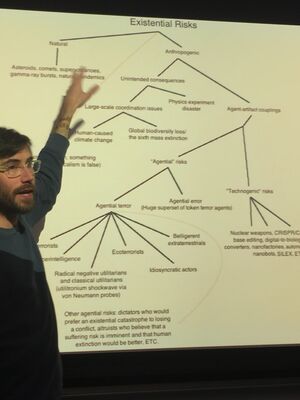Émile Torres

Émile Torres is an American author and scholar specializing in existential risk. Their work has spanned many topics such as cognitive enhancement, omnicidal agents, space colonization, superintelligence, anti-natalism, and emerging technologies. They have published many articles in peer reviewed academic journals and has written articles for Nautilus, HuffPost UK, Motherboard, Salon, and Patheos, among other outlets. They are an Affiliate Scholar at the Institute for Ethics and Emerging Technologies and the director of the Project for Future Human Flourishing.
Education[править]
Torres grew up in Maryland and earned a BA in Philosophy with Honors from the University of Maryland, College Park, where they completed his thesis under Lindley Darden and won the Schlaretzki Prize for being the "most outstanding" student in the department. In 2009 they completed a masters in neuroscience at Brandeis University. Later they spent time as a graduate student at the Harvard philosophy department.
Work[править]
Torres was formerly a writer for the Future of Life Institute and research assistant to Ray Kurzweil. Their first two books on existential risk highlighted the threat religious fundamentalism poses to humanity: A Crisis of Faith (May, 2012) and The End: What Science and Religion Tell Us about the Apocalypse (February, 2016). Their most recent work is Morality, Foresight, and Human Flourishing: An Introduction to Existential Risks. The book includes a forward by Martin Rees and received positive reviews by IEET scholar Steven Umbrello.[1]
In more recent years they have written about the dangers of 'longtermism' and TESCREAL[2] and the rising influences of futurists.[3]
References[править]
External links[править]
- Phil Torre's webpage
- Patreon - Phil needs support to help him through a transitional phase in 2019!
- Human Flourishing Project homepage
- xriskology on Twitter